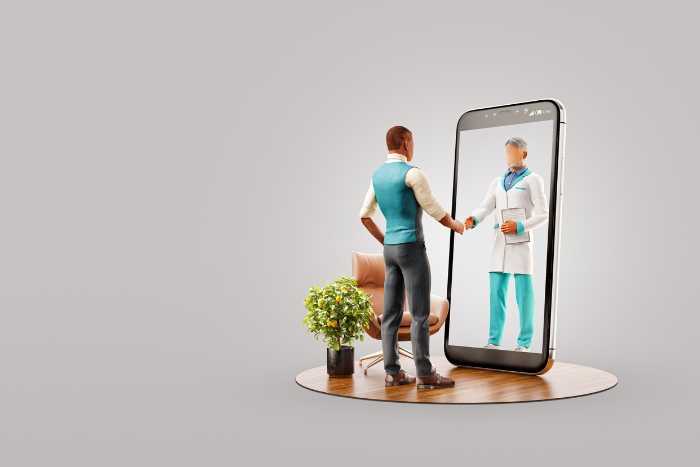Throughout the whole of lockdown and beyond we are seeing technology become a more prominent part of our everyday lives. This includes our healthcare and how we reach out and receive medical advice and treatment. Patient apps and virtual appointments have become the mainstream, as patients look to avoid packed waiting rooms and maintain social distancing.
Apps such as Patient Access, My GP, My Pathway and many more have been widely adopted by the NHS and GP practices in order to continue treating patients during social distancing. This need to adopt new practices has seen both the tech-savvy and more technophobic amongst us migrate to a new way of engaging with our records and healthcare providers.
This period has also witnessed the growth of web-based access to advice through the NHS. Patients have been able to check symptoms with telephone appointments and advice offered through the non-emergency NHS 111 number. Furthermore, video calling and conferencing became another commonplace way to treat patients. Overall, these remotely accessible services have allowed those who require advice and treatment to continue despite the disruptions and like with many aspects of our lives a new normal is coming into play. Does this mean that remote healthcare is here to stay?
What patients want to see in the future
Well, 53% of British patients said they would continue to use technology for receiving healthcare based on their experiences during the pandemic. Furthermore, 59% found video conferencing good/excellent for receiving treatment. This is significant given that 70% were using video calling for the first time. [1]
While the evidence points to the success of these new channels, what would happen if you don’t speak/read English? COVID-19 has disproportionately affected the BAME community across the UK, making it clear that communication and using language support is a key aspect in helping the whole of the UK stay safe throughout the pandemic.
Translation of mobile apps allows for non-English speakers to access the same level of healthcare as English speaking patients. In addition, through the translation of medical apps, non-English speakers can understand their own symptoms and reduce the risk of spreading COVID-19. They can also reduce the harm they could cause themselves from going untreated as they are unaware of how to access medical care. Translation of websites, instructions and FAQs about patients apps as well as online medical services can further assist in ensuring that medical care is accessible for all.
Remote interpreting services in healthcare
As previously mentioned, telephone and video services have also made up the remote medical response to COVID-19 and the continuation of treatment for many patients. Of course, interpreting services are needed for both of these mediums.
Telephone interpreting is available quickly and can be efficiently integrated with already existing systems, which means patients are not waiting for ages for an appointment to be made in order to accommodate and interpreter and instead can speak to a professional immediately to access the care they need. Telephone interpreting is already widely used amongst the 999 call handlers as they assist non-English speakers in emergency situations.
During these unprecedented times, language needs can change. Remote services have allowed for flexible and efficient access to language support to help all patients. For example, as face to face appointments may no longer be able to go ahead video appointments allow for appointments to continue with the added benefit of being able to see the patient and being able to communicate verbally.
Video conferencing allows for multiple professionals to be involved in one call. Family members can also be involved if their support is needed. Video interpreting is easy to use and is an essential service when handling remote appointments with BSL users.
Improving the patient experience with language services
Overall, technology has helped to make healthcare accessible during the pandemic. However, it is important to continue to work on making it accessible every last person.
DA Languagess aim to remove language barriers, allowing our amazing NHS and medical staff to do what they do best unhindered and provide the best treatments for all patients. Moreover, 61% of patients stated that their trust is healthcare providers increased[2] during the pandemic, which is fantastic but can only increase with the use of language services.
DA Languages is one of the top language service providers to the NHS. We also work closely with suppliers and partners within the healthcare industry. We provide high quality and reliable remote language support through Video, Telephone Interpreting and Translation.
If you are interested in any of our remote services and would like to find out more contact us today!
[1]http://www.pharmatimes.com/news/survey_reveals_britains_welcome_shift_to_virtual_healthcare_1347077
[2]http://www.pharmatimes.com/news/survey_reveals_britains_welcome_shift_to_virtual_healthcare_1347077



